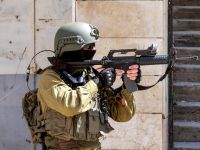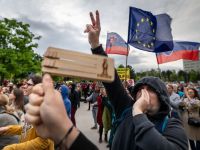In one of the bloodiest days in 17 months of conflict between Israel and the Palestinians at least 17 Palestinians were killed, twelve of them Palestinian policemen, PA officials said.
They added four of the dead were killed in a missile attack on Palestinian leader Yasser Arafat's Gaza compound, seven in Israeli shelling of two Palestinian police checkpoints near the West Bank town of Nablus, two in a firefight outside the Balata refugee camp close to Nablus, one in an airstrike on a Palestinian police post in the town of Ramallah, and one in a firefight near Ramallah. On Wednesday afternoon, two Palestinians shot dead near Kissufim checkpoint in Gaza Strip.
These heavy Israeli assaults came after Palestinian gunmen shot dead Tuesday night six Israelis at an army checkpoint in the West Bank.
PA
Arafat, under siege at his Ramallah headquarters since early December, told reporters ``The tanks and the missiles and the planes do not terrify us.'' ``The Israelis insist on avoiding the peace process but we will raise the Palestinian flag on the walls of Jerusalem.''
Earlier, the Palestinian leadership called for an emergency session of the United Nations Security Council to address the massive escalation in the conflict with Israel, a top aide to Arafat told AFP.
"The Palestinian leadership will go to the Security Council to call for a special emergency meeting to stop Israeli attacks," Nabil Abu Rudeina said. "Israel is starting a new stage of war against the Palestinians. Its military escalation of last night will lead to an explosion," he said, calling also on the world community, and especially the United States, to intervene.
Palestinians "are swimming in their blood," chief negotiator Saeb Erakat said also, calling for intervention from the United States and the European Community.
"Last night alone we had 14 Palestinians killed," he told BBC radio from Jericho in the West Bank. "I hope the Israeli people will start asking this government: what did you bring us, peace?" Erakat asked.
"I hope the United States of America and the European Union will re-engage immediately because we need the help of a third party."
Israel
Meanwhile, Israel’s Prime Minister Ariel Sharon convened his security cabinet in special session Wednesday morning to consider possible shifts in military policy as a result of the upsurge in violence.
No details emerged from the security cabinet meeting, but officials said later that the ministers had decided on an unspecified new "outline" for battling violence, and Sharon was quoted as saying that Israeli policy would undergo a change in direction.
According to media reports, the cabinet will instruct the Israeli army to focus its operations in the West Bank.
The Jerusalem Post reported that the Israeli army would increase the number and diversity of operations in line with new guidelines adopted at the meeting. Furthermore, Israeli Prime Minister Ariel Sharon will meet with the army and security services' leadership to track the implementation of the new guidelines, Israel Radio reported.
The Israeli army has already beefed up the number of soldiers manning a number of roadblocks and is considering removing others. Mobile roadblocks will replace static positions.
Earlier on Wednesday, a top advisor to Sharon said Israel was facing a "total confrontation" with the Palestinians.
"We are in a total confrontation, since the Palestinian entity wants to supplant the Jewish state, and its leader Yasser Arafat is seeking an escalation knowing full well he cannot conquer us," said Zalman Shoval, Sharon's foreign advisor.
"The thing is whether Israel can carry out a political process with someone who is not ready to compromise," he said on public radio.
Shoval, a former ambassador to Washington, added that, "Mr. Sharon is not under pressure from the United States, but has to deal within his national unity coalition with the Labor Party which limits his responses to Palestinian terrorism." (Albawaba.com)
© 2002 Al Bawaba (www.albawaba.com)







